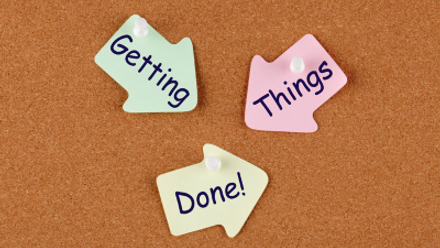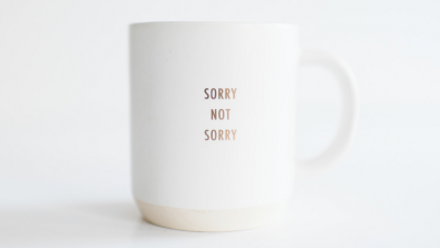The Benefits of Routines and Habits
7 minute read
In today’s busy world, it’s easy to feel overwhelmed by the endless to-do lists and unexpected demands on our time and energy. One of the simplest yet most effective ways to bring calm, clarity and control back into your life and household is by establishing routines and habits. But what exactly are these and why do they matter so much?
Routines are regular, often time-based actions that we follow day after day, such as a morning coffee ritual or an evening tidy-up. Habits are the automatic behaviours we develop through repetition, like brushing our teeth or locking the door. Together, they create a framework that can reduce stress, boost productivity and bring a sense of order to the chaos.
“We are what we repeatedly do.
Excellence, then, is not an act, but a habit.” Aristotle
By consciously shaping our routines and habits, we can cultivate excellence, not just in our personal lives, but across the entire household.
APDO member Julia Jamieson explores the many benefits routines and habits bring to you and your family, with practical ideas to help you build them effectively.
Understanding Routines and Habits: What’s the Difference?
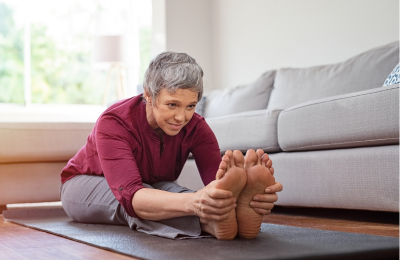
Before diving into the benefits, it’s helpful to clarify what we mean by routines and habits - and how they differ.
A routine is a sequence of actions you follow regularly, often linked to a specific time or event. For example, you might have a morning routine that includes making your bed, having breakfast, and packing lunches. Routines are usually conscious and planned, providing structure to your day.
A habit, on the other hand, is an automatic behaviour triggered by a cue or context. It’s something you do almost without thinking - like brushing your teeth after waking or checking your phone when you hear a notification. Habits form through repeated actions until they become ingrained in your daily life.
While routines and habits are distinct, they work hand in hand. A routine can help establish new habits by providing consistent cues and repetition, while habits make routines easier to maintain because some parts become automatic over time.
Understanding this difference is key to building effective systems that work for you and your household. For more on habit science and practical strategies, James Clear’s comprehensive guide on habits is an excellent resource.
Benefits of Routines and Habits for Individuals
Routines and habits offer numerous advantages that can positively impact your daily life, wellbeing, and overall productivity.
One of the biggest benefits is the reduction of decision fatigue. When you automate regular tasks, you free up mental energy for more important decisions and creative thinking. For example, having a set morning routine eliminates the need to decide what to do first, allowing you to start the day with focus and calm.
Routines and habits also help improve time management and productivity. By creating predictable patterns, you can allocate time efficiently and ensure essential tasks aren’t overlooked. This sense of control often leads to increased motivation and accomplishment.
Moreover, establishing routines can boost your mental health by providing structure and stability, especially during stressful or uncertain times. Knowing what to expect reduces anxiety and creates a sense of security.
“The secret of your future is hidden in your daily routine.”
Mike Murdock - Starting small can have a ripple effect that enhances your wellbeing.
To begin building effective habits, try focusing on one simple action at a time, gradually layering more as you become comfortable. This approach makes change manageable and sustainable.
Benefits for the Household
Routines and habits don’t just benefit individuals, they create a positive ripple effect throughout the entire household. When everyone knows what to expect and what’s expected of them, life at home runs more smoothly and harmoniously.
One key advantage is the reduction of conflict and confusion. Clear routines around mealtimes, chores and bedtime, set boundaries that help avoid misunderstandings and arguments. This consistency brings a sense of calm and order, even in busy or chaotic periods.
For children, routines provide a vital sense of security and stability. Knowing what comes next helps reduce anxiety and builds confidence. It also encourages them to develop responsibility and independence as they learn to manage parts of their daily routine themselves.
Routines can also foster teamwork and shared responsibility. When everyone participates in tasks like tidying or meal prep, it strengthens family bonds and ensures no one person feels overwhelmed.
In short, well-established routines build a foundation of stability and cooperation that benefits every member of the household.
How to Build Effective Routines and Habits
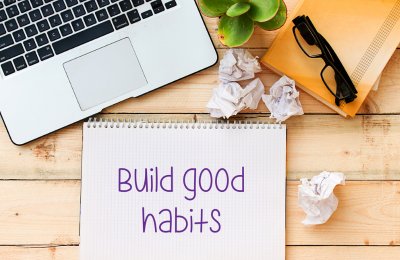
Creating routines and habits that truly support your lifestyle doesn’t have to be overwhelming. It’s about starting small, being consistent and making adjustments that suit your unique household.
1. Start small and focus on one change at a time.
Pick one small habit - like unloading the dishwasher every morning or laying out clothes the night before. Establish this one habit before adding another. This builds confidence and momentum.
2. Use triggers and cues.
Link your new habit to something you already do. For example, “After I brush my teeth, I’ll spend five minutes tidying the bathroom” or “Once we’ve had dinner, we’ll all do a five-minute tidy-up.” These cues help make habits more automatic over time.
3. Track your progress.
Visual cues such as tick boxes on a calendar, habit tracker apps (like Habitica) or Streaks), or even a handwritten list can be motivating. Celebrating small wins along the way encourages consistency.
4. Make it visible and easy.
Set yourself up for success by removing friction. Want to read more? Leave a book by your bed. Want to start a family morning routine? Use a whiteboard or fridge planner so everyone knows what to expect.
5. Personalise your routines.
There’s no one-size-fits-all approach. What works for one household might not work for another. Be open to trial and error and allow your routines to evolve with the seasons of life.
With a little intention and patience, routines and habits can become the backbone of a calmer, more organised home life.
Practical Ideas to Implement Routines in Your Home
It’s about creating rhythms that make everyday life easier, not harder. Here are some simple, practical ways to get started:
Morning and evening rituals
Set the tone for the day with a morning routine that includes tasks like getting dressed, eating breakfast, and reviewing the day’s plans. In the evening, wind down with a consistent bedtime routine, perhaps a screen-free half hour, reading, or a quick family tidy-up. These anchor points help children and adults feel grounded.
Weekly planning sessions
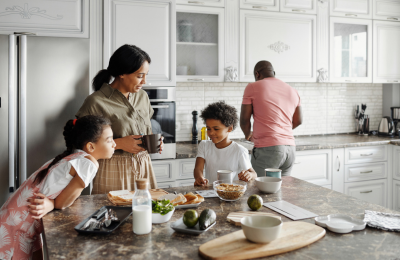
Choose a day each week, Sunday works well for many, to plan meals, appointments, and
household tasks. Involve the whole family using a wall planner or shared app like Cozi or Google Calendar. This encourages communication and shared responsibility.
Five-minute resets
Introduce short “reset” moments throughout the day, especially after high-use times like breakfast or before dinner. A quick timer can make it fun for kids - everyone races to return things to their homes. These habits prevent clutter from building up.
Paperwork and admin habits
Create a habit of dealing with post or school letters at a set time each day or week. Keep a designated tray or folder for papers and schedule a weekly admin session to stay on top of life admin.
Decluttering habits
Build micro-habits like “one in, one out” for toys, clothes, and household items. A regular monthly mini-declutter session keeps things manageable and helps avoid overwhelm.
Use tech to support routines
Digital reminders and alarms can prompt you until habits become automatic. Visual schedules or checklists for children can promote independence and confidence.
“Motivation is what gets you started. Habit is what keeps you going.”
Jim Ryun: Start small, keep it consistent, and you’ll soon notice the difference in your home.
Overcoming Challenges and Staying Flexible
Even the best-planned routines and habits can be disrupted by life’s unpredictability,illness, travel, school holidays, or simply a tough day. The key is not perfection, but progress. Learning to adapt while staying committed to your overall goals is essential for long-term success.
Be realistic, not rigid.
Routines are meant to support you, not constrain you. If something isn’t working, tweak it.
Expect setbacks - and reset with compassion.
Everyone slips up now and again. Missing one day doesn’t mean you’ve failed. What matters is how you respond. Recommit gently the next day without guilt.
Avoid perfectionism.
Trying to stick to a routine perfectly often leads to frustration and giving up altogether. Instead, aim for consistency most of the time. A 70–80% success rate over weeks or months is far more impactful than burning out after a few days of “all or nothing.”
Celebrate the small wins.
Acknowledging progress, however small, keeps motivation high. Celebrate that momentum.
Remember, routines are tools to make life easier. They should grow with your household, not feel like another to-do list. Stay flexible, kind to yourself, and focused on the bigger picture.
Small Habits, Big Impact

Routines and habits may seem simple, but their impact on your wellbeing, and your household's harmony, can be profound. By reducing stress, boosting productivity, and creating a sense of structure, these everyday rhythms help you move through life with more ease and intention.
Whether you’re looking to streamline busy mornings, keep on top of housework, or simply create more calm amidst the chaos, establishing routines and habits is a powerful step forward. Start small, stay flexible, and remember that consistency, not perfection, is the real goal.
The small things you do today can shape a more organised, balanced, and joyful tomorrow, for you and everyone in your home. Remember, "Success is the product of daily habits, not once-in-a-lifetime transformations" - James Clear.

